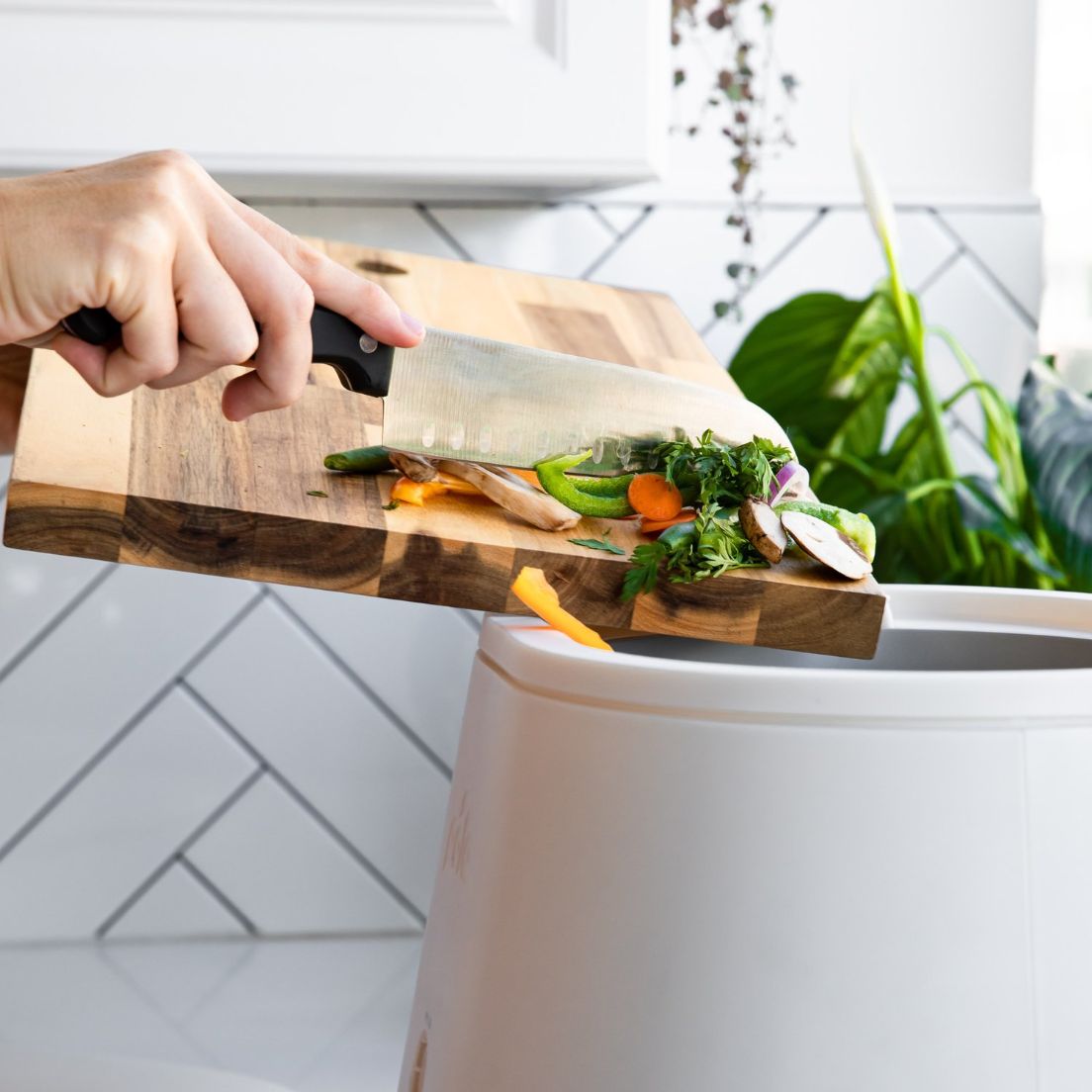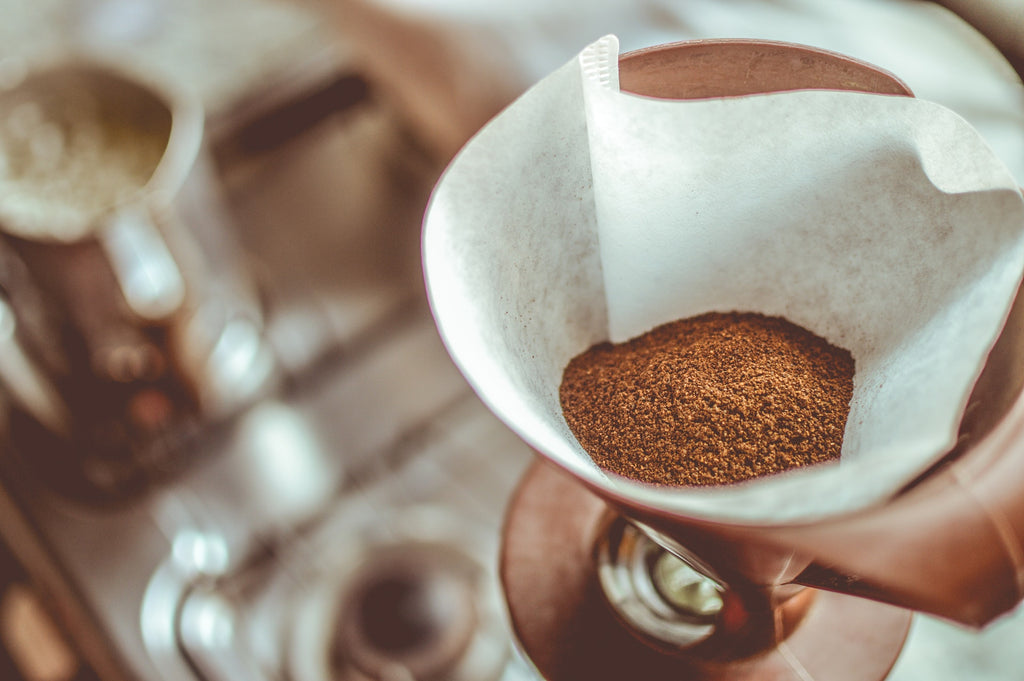
One of the most used items in your home is coffee filters. They are used at least once a day, or more for those who drink coffee more frequently. The coffee grounds that you are using can be used as compost, but what about the coffee filters that you are using? Instead of having to constantly scrape off the coffee grounds, store them, and then add them to compost later, wouldn't it be great to compost them together? It is time to ask, can you compost coffee filters?
If you are wondering what other household items can be composted, you can find a comprehensive list of compostable household items here.
Different Types of Coffee Filters
There are different types of coffee filters available to purchase, and some coffee drinkers prefer some to others. Because of how they are made, you may wonder are coffee filters biodegradable?
Paper Coffee Filters

A thin layer to keep grounds out of the pot, these filters are often purely paper and sometimes bleach. If you have paper coffee filters that are completely white before they are used, then they have been bleached beforehand. This is done as a way to appear clean so that you know you have a clean filter, and it will turn once the coffee has been brewed and collected on the grounds. These coffee filters that have been bleached are not the most environmentally friendly options, but they will break down and be biodegradable.
Unbleached Coffee Filters

These coffee filters are just like bleached coffee filters, but they are in their natural color. Without the bleach, they are just a natural color that for some appear to be less desirable because they look used. These coffee filters are also biodegradable as well as a better option for the environment. If you are looking for a more organic and strictly chemical-free option for your compost, you will want to look for coffee filters that are unbleached in coffee filter compost.
Plastic Coating Filter

There are some coffee filters that have a layer of plastic coating because they are meant to be reused. These should not be used in your compost, but instead washed and returned to the coffee pot. When you dump your grounds in your compost, you will have to scrape all of them out of the plastic filter to make sure they all get in the compost.
Chemex Coffee Filters

The Chemex Coffee Filters are designed to be a thicker version of the standard paper filters. They are strong when it comes to keeping the grounds of coffee from passing through into the pot. Their cups of coffee have less acid than others as a way to promote healthier cups of coffee. When it comes to the question, are Chemex filters compostable, the answer is yes because they are paper. There is no bleach in the coffee filter, so it can be tossed right in with the grounds when you go to compost your coffee. They are designed with the environment in mind, having no chemicals in them so that when they start decomposing, they are not releasing chemicals into the environment.
Are Coffee Filters Bad For The Environment?

Depending on the type of coffee filters you are using, that can determine if they are bad for the environment. While the white coffee filters do have some bleach in them to make them white, the bleach amount in them is minor compared to other papers and items that are gathering in the environment. Bleach or no bleach, any paper coffee filter is biodegradable and will break down over time. If you are looking to have 100% organic and chemical-free compost for your garden and plants, then you may want to make the switch to an unbleached coffee filter if you have not already done so.
If you do not add coffee filters to compost and throw them in the trash, they will dry out before they make it to the landfill. Once they dry out, they can still start the break down process, but it will take longer because they are dry. Until they break down, they are adding to the garbage in the landfill and accumulating at a rapid rate because they are being added daily.
Other Coffee Filter Options

Instead of consistently using paper filters, either bleached or unbleached, you can take advantage of reusable coffee filters to cut down on the amount of paper and trees that are used for coffee filters annually. You will just need to pile your coffee grounds in another location and then rinse your reusable coffee filter so that you can continue making your coffee while storing your grounds. If you have an in-home compost bin, you can just simply take your coffee grounds over to the bin and add them to the current compost so that they begin breaking down.
How To Compost Coffee Filters

If it is important to you to keep using paper filters, as that is some coffee drinkers' preference, then you will need to know how to properly compost these coffee filters. Depending on whether you plan to use bleached or unbleached coffee filters is completely your choice. The amount of bleach in a bleached coffee filter is a small amount that only shows traces in your soil if you use them in your compost.
When you go to add your coffee grounds into your Lomi food composer, you can just add the filter right in with the grounds. This filter is able to manipulate the oxygen within the compost, and help with the overall process of your compost breakdown. What you do not want to do is let your paper filter dry out. As long as the filter is wet and moist, it will start the breakdown process quickly and biodegrade in a rather quick state. If it dries it, it becomes 'brown compost' similar to dried leaves and other brown things that take longer to break down.
By putting these grounds and filters in the compost, you do risk the chance of a strong odor when the coffee grounds break down, but you want to spread it out within your compost so that it is not gathering in one area and causing a stench build up. Also, if you are going to put your coffee filter in the compost, make sure it is buried in there so that it is not adding to the unwanted odor when you open your Lomi food recycler.
How Long Does It Take Coffee Filters to Degrade?

Once you start the biodegradable and composting process on a coffee filter that is wet, it can take anywhere from six months to eight months for a single filter to decompose. This is relatively quick and normal when it comes to organic decomposition. If you let the filter dry out, however, and start the decomposition process with a dry coffee filter, it will take even longer to start breaking down and decomposing.
When you use a food recycler like Lomi, you can speed up that process to be anywhere from one month to four months, because the container is sealed, maintaining the appropriate moisture levels so that the breakdown cycle can happen at a much quicker rate. Those who enjoy growing their own plants or want to give back to the environment find this to be an ideal option, especially if you use lots of coffee filters and grounds regularly.
Moving Forward With Your Coffee Filters

As you move forward with your coffee waste and coffee filters, you want something that will help them break down quickly and take advantage of eliminating waste in your home. With the Lomi, you can have the food waste in your kitchen broken down quickly so that you can reuse that. Put it in the soil for your indoor plants, maybe some plants you have out on your patio, or your herb garden.

Composting Coffee Grounds

There are a few things you need to keep in mind when you start composting coffee grounds, also. First, you want to make sure they are used. While you could use a sprinkle of unused coffee grounds, the amount of acid in them is so strong that dropping more than a couple of teaspoons in your composer could make the soil too acidic.
It is important to note that when you start composting coffee grounds, you are reducing the amount of kitchen waste in landfills and offering a better source of food and nutrients to your personal plants. When you put these in a compost bin instead of directly into the soil, you are allowing it to break down quicker and offer more nutrients once you move that compost to the soil of your choice.
Keep Adding To Your Compost

One of the best ways to keep your Lomi compost bin happy and balanced with the different food waste is to continue adding your coffee grounds and your coffee filters. They keep a balance of acid and brown and green mix of items within the bucket so that it continues to break down and turn consistently until you have nutrient-rich plant food ready to supply.
In Conclusion
The best way to dispose of coffee grounds and coffee filters is to put them in compost and let them break down naturally. The acid and nutrients that are found in coffee are great for compost. While you can deposit some of this directly onto your plants, you do not want to do this too often or use too much. With Lomi, you can balance the nutrients and manage your kitchen waste so that you are not putting too much on your plants, stunting their growth with caffeine or burning them with too much acid from the coffee.
